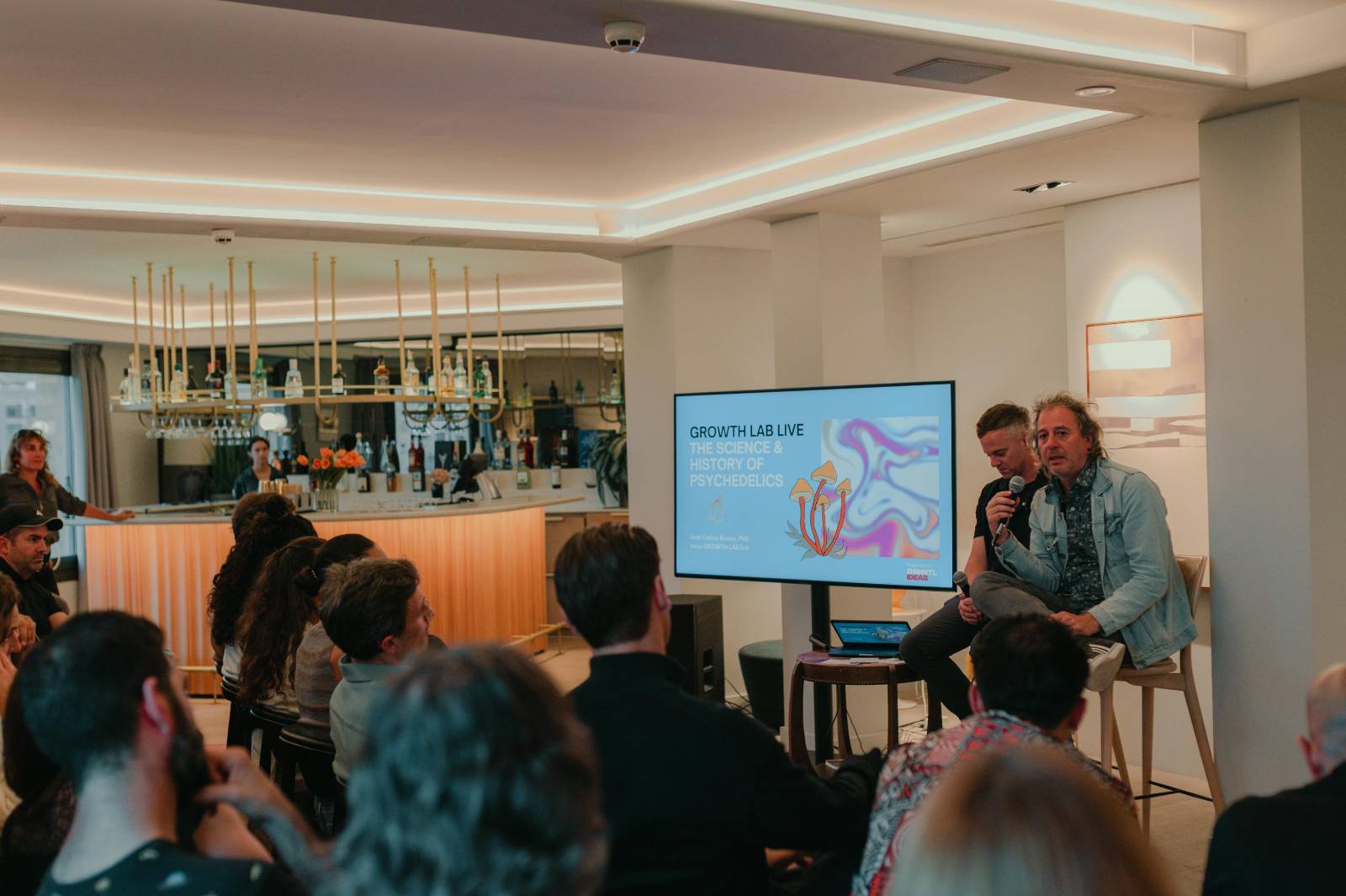Francisco Gómez | June 12, 2025
A patient receives a psychedelic substance in the controlled environment of a hospital. Another person shares the same experience, but in a community room, surrounded by other people and guided by a facilitator, in a traditional setting. These two scenes encapsulate the contrast — and tension — between two ways of understanding care, knowledge, and healing.
This was the starting point for the lecture given by Dr. José Carlos Bouso, scientific director of ICEERS, on May 22 at The Cover Club in Barcelona, as part of the series organized by Growth Lab. Under the title “The Science & History of Psychedelics,” Bouso explored the neurobiological basis for the use of psychedelics, their history, and the challenges posed by their integration into the Western biomedical model.
Scientific evidence
The presentation first addressed the classification of classic compounds — such as psilocybin, LSD, mescaline, and MDMA — and explained their mechanism of action, based mainly on the activation of the 5-HT2A receptor. This receptor, linked to the regulation of mood, perception, and self-awareness, is key to understanding the effects these substances produce. In animal models, for example, the phenomenon known as the “head-shaking response” is observed, a behavioral marker of the serotonergic agonist effect.
Dr. Bouso also analyzed scientific advances that document how psychedelics impact the human brain: reduced activity in the amygdala (linked to fear), increased oxytocin (related to empathy and bonding), and greater connectivity in regions involved in emotional regulation.
However, the core of his presentation revolved around a fundamental question: what forms of knowledge and care do we recognize as valid? While some substances are making their way toward regulatory approval in medical and highly protocolized contexts, others remain under regulations that criminalize traditional practices. Bouso called this imbalance “the paradox of psychedelics”: on the one hand, Western medicine presents them as individual, medicalized treatments managed by the pharmaceutical industry; on the other, they are a collective, ancestral practice oriented toward community transformation.
The integration of knowledge versus the biomedical model
Dr. Bouso closed with a reflection on the challenges of the present moment. In his own words, clinical advances in the study of psychedelics should not marginalize traditional contexts or impose a single model of use. The researcher raised the need for a framework that allows for the coexistence of medical and cultural practices and recognizes the collective rights linked to this knowledge.
The scientific director of ICEERS defended our organization’s approach, emphasizing the need to incorporate a more complex and diverse understanding of what we mean by scientific evidence, broadening — rather than narrowing — the paths through which we access knowledge, from a critical and rigorous perspective. For Bouso, bringing together the various views on psychedelics and their medicinal uses is the key to addressing the difficult challenges that Western society faces in terms of mental health.
The doctor of pharmacology from the Autonomous University of Barcelona emphasized that, in his opinion, the West is experiencing a veritable “epidemic of loneliness,” which is not being adequately addressed by the dominant scientific and pharmacological approaches. Proof of this is the growing concern on the part of governments such as those of the United Kingdom and Japan, which have been forced to create a Ministry of Loneliness in 2018 and 2021, respectively.
The presentation ended with a call to renew our perspective: to open ourselves up to learning from cultures that have developed, over centuries, complex forms of accompaniment and medicinal use of psychoactive plants. From this perspective, ICEERS works to promote the ethical and sustainable integration of these practices into our societies, always with respect for collective rights and traditional knowledge.
Categories:
EVENTS
, Noticias
, NEWS
Tags:
psychedelics
, traditional medicine
, traditional medicine
, psychoactive plants
, public health
, mental health
, mental health
, psychedelics

